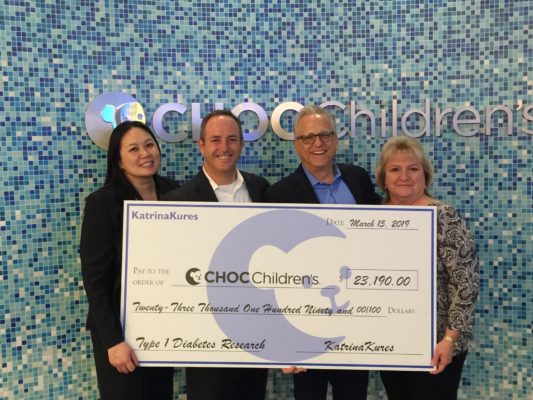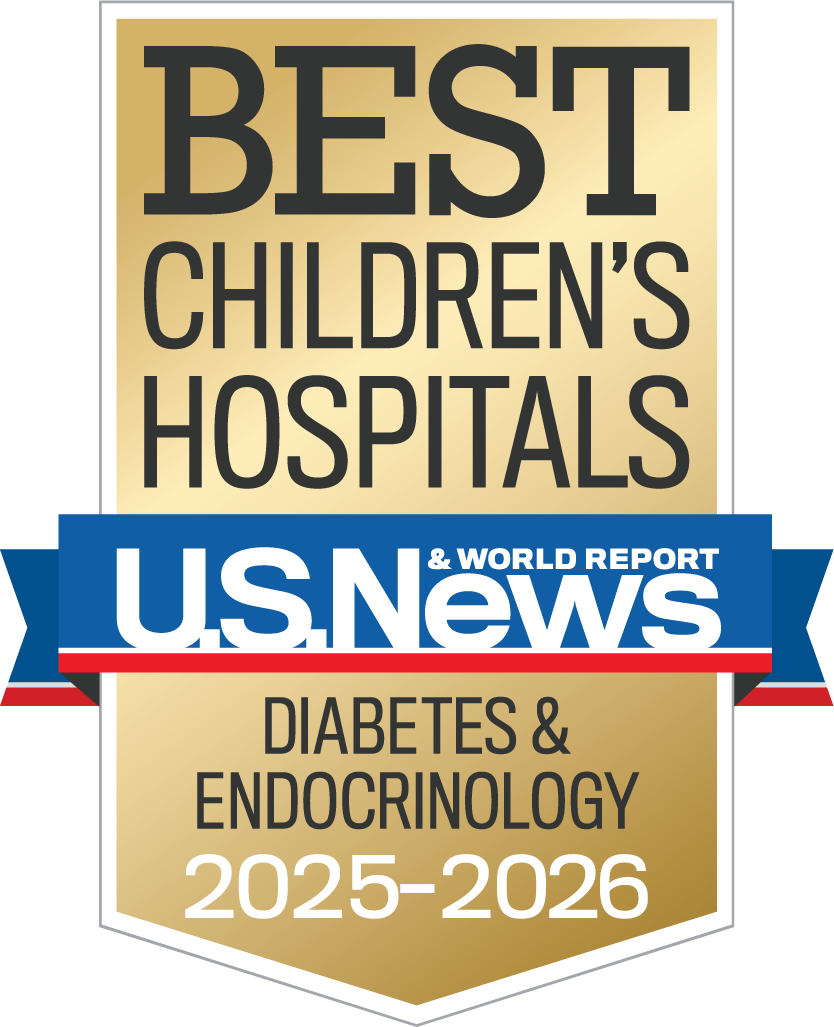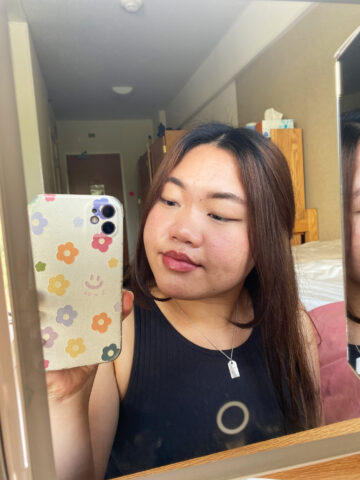When Katrina, now age 28, was a teenager, she knew about type 1 diabetes because her friend had it – she just never expected to be diagnosed herself.
Katrina’s journey to a diagnosis started after she experienced typical signs and symptoms of type 1 diabetes – weight loss and extreme thirst, among others.
During a cheerleading practice, she mentioned she felt thirsty “all the time” and her mom’s ears perked up. This prompted a trip to her pediatrician, who tested her blood sugar levels. They were 707, and a typical 13-year-old’s levels should have been around 100.
“Being diagnosed with type 1 diabetes at age 13 was life-changing,” Katrina says. “But having my best friend and her brother with type 1 and their mom being a nurse helped me navigate the early days of it and not go in blind.”
She adds that the support she received from her CHOC team in the early days of her diagnosis also made the transition into her “new life” much easier.
“The care that I received at CHOC was above and beyond,” Katrina says. “That time in a girl’s life can be the hardest of all – the stress of high school, hormones and sports to name a few – but it was definitely so much easier with the help of Dr. Clark.”
Her primary pediatric endocrinologist was Dr. Susan Clark, a longtime CHOC physician and nationally-recognized expert in diabetes and endocrinology who passed away in 2017.
“Dr. Clark was the reason I became so successful in managing diabetes. She always had a positive outlook,” Katrina says.
As counting carbs and taking daily insulin injections became her norm, Katrina also began quarterly checkups with the endocrinology team at CHOC.
“I always came to appointments with so many questions. I’m a sweet tooth, and no matter what food I asked my team about eating, they would always come from a place of, ‘Yes you can have anything you want. We will help you figure things out safely,” Katrina recalls. “I was in high school at the time, and if my friends were going to 7-Eleven to get ICEEs, I didn’t want to feel held back; I just wanted to be able to enjoy my adolescence.”
Also notable about her frequent appointments, Katrina says, is that Dr. Clark and her team took the time to truly partner with her and allow her to take an active role in her own care.
“Dr. Clark would address me first – not my mom or dad. She asked her questions to me. ‘How are things going? What do you want to change?’” Katrina recalls. “It’s easy to feel belittled at that age, but Dr. Clark always treated me like an adult and made me feel empowered.”
For those reasons, Katrina considered her CHOC visits not a chore, but “like going to see an old friend.”
Although Dr. Clark primarily managed her care, Katrina became familiar with other endocrinologists and staff at CHOC during her frequent appointments – including Dr. Mark Daniels, medical director of pediatric endocrinology at CHOC.
CHOC experience inspired her career
Katrina’s career interests were ultimately impacted by her CHOC experience. After college, she joined CHOC as an intern, working on with the research team for CHOC’s endocrinology program.
“My experiences at CHOC were so positive that my career interests flipped to the medical field. Having the chance to work with the endocrinology team that diagnosed and took care of me was like a dream,” Katrina says. “Interning at CHOC confirmed in my mind that if you have a child and something happens – diabetes or anything else – CHOC is the best place you can find. Everyone genuinely cares about the patients and employees.”
As part of her internship, she shadowed Dr. Daniels.
“His rapport with patients and the rest of the medical team was amazing. He knows how to talk to anyone and make them feel empowered, and like what they have to say is important,” Katrina recalls. “He was always so much fun to have a conversation with because I would always learn something new.”
Transitioning to adult care
Katrina’s care was transitioned at age 21 out of CHOC to an adult doctor, which she has found to be a much different experience than the one she had growing up.
“When I was at CHOC, all my appointments felt like open conversations; they never used an accusatory tone. I was empowered to make safe, health decisions. I was part of the solution,” she says. “At my adult doctor, sometimes I think, ‘You don’t have diabetes. You don’t get it.’ But when I was at CHOC, my walls were always down.”
Around that time, she met her now-husband Jake at a fundraiser for PADRE Foundation (Pediatric Adolescent Diabetes Research & Education) – a non-profit that serves thousands of Southern California families living with type 1 diabetes through free education classes taught by CHOC educators and a variety of youth and family programs.
Jake, a firefighter, has been living with type 1 diabetes since he was diagnosed at age 3.
Giving back
Given Katrina’s diagnosis and her family’s philanthropic spirit, raising funds to find a cure was a natural way for the family to give back to CHOC. Starting in 2009, the family of runners organized yearly charity races, dubbed Katrina Kures, to raise money for CHOC researchers who are studying diabetes. To date, the family has raised nearly $200,000.

“Part of why we give back to CHOC is that we’ve had such a positive experience there as a family. If we had had a negative experience, we wouldn’t do what we do for CHOC,” says David, Katrina’s dad. “CHOC takes as much of an interest in research as we do. Every time we go to CHOC, you can tell they’re doing something amazing. You can see how CHOC is helping the most vulnerable and the most innocent. We want the money to go toward research for a cure. I hope the cure for diabetes will happen in my lifetime. It’s getting closer.”
Dr. Daniels and his team oversee the funds raised and donated annually by Katrina’s family.
“Dr. Daniels is at the top of his game for research. Whatever he thinks will have the most impact on finding a cure, we’re all in,” says Beth, Katrina’s mom.
The high opinion the Jewell family has of Dr. Daniels goes both ways.
“The Jewell family’s continued dedication to making a better future for people living with type 1 diabetes is truly inspiring. Every time I am around Dave, Beth, their son Jesse, Katrina and Jake, I feel the passion that they have for this cause, and it motivates me and everyone in their presence to work harder, be better and strive for a permanent solution to diabetes. They are my heroes,” Dr. Daniels says.

Finding a cure is especially important to Katrina, as she and her husband will soon expand their family.
“Having the money go toward finding a cure is huge, not just for us, but especially as we’re expecting our first child, it makes the cause so much bigger,” she says. “We’re very proud to be partnered with CHOC and excited about what’s to come.”
Advice to others with diabetes
Living with diabetes for nearly two decades has given Katrina a unique perspective on the disease. She hopes to give other people living with diabetes a message of inspiration.
“Consider what you can control and what you can’t control. Everyone goes through difficult times in life. Your outlook affects the way diabetes affects you,” she says. “Diabetes is a huge hand to be dealt. If I went into it with a negative mindset, I wouldn’t want to do injections, which would affect my blood sugar levels.”
Katrina and Jake hope to show others living with diabetes all that is possible, despite their disease.
“A lot of people’s preconceptions about diabetes come from knowing someone with type 2 diabetes,” Katrina says. “I want people to know that people with type 1 diabetes are just as free with food as you are; there’s just an algorithm running in our minds when we see a plate of food, and we’re making different calculations and decisions than you have to.”
As a paramedic and firefighter, Jake’s job is grueling and physically demanding. Many people didn’t think such a career was possible for him.
“In my paramedic program, we were learning about different medical conditions and they basically said that people with diabetes can’t exercise more than 30 minutes at a time and if they miss a meal they will become hypoglycemic, which isn’t necessarily true,” he recalls. “Diabetes is something that I live with and work with, but it doesn’t run my life.”
Katrina adds that having a strong team around you is essential to maintaining proper health and a positive attitude.
“Because I had a great support system, and the medical care I received at CHOC was so amazing, I was able to live a full life growing up,” she says. “I could do cheer team, earned above a 4.0 GPA in high school, go away to college and manage my diabetes on my own, go on runs and do half marathons. All of these are particularly big accomplishments for someone living with diabetes.”
Get more expert health advice delivered to your inbox monthly by subscribing to the KidsHealth newsletter here.

Learn more about CHOC’s Endocrinology Services
CHOC Hospital was named one of the nation’s best children’s hospitals by U.S. News & World Report in its 2025-26 Best Children’s Hospitals rankings and ranked in the endocrinology specialty.





